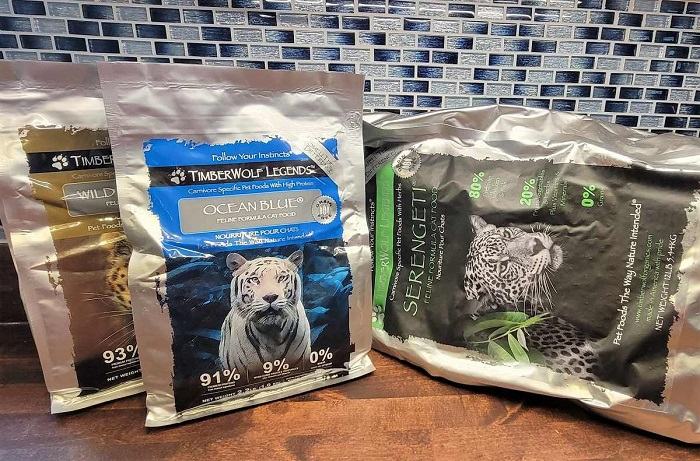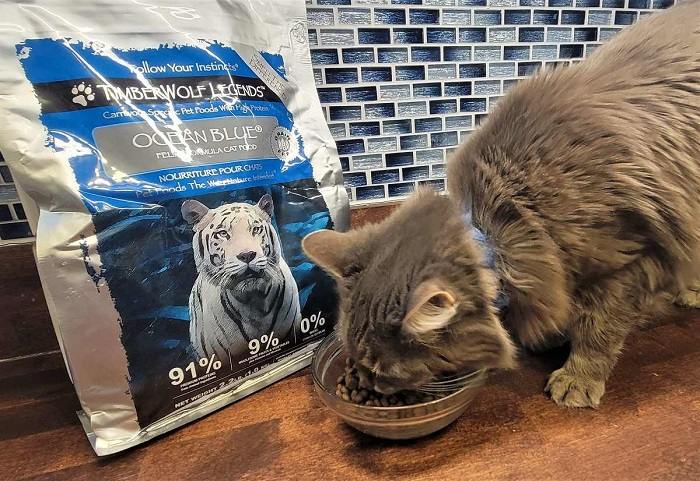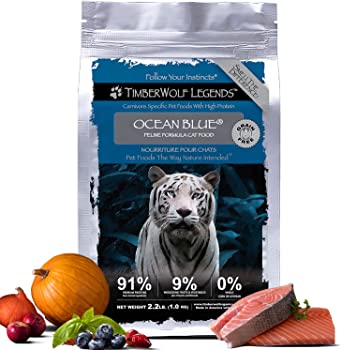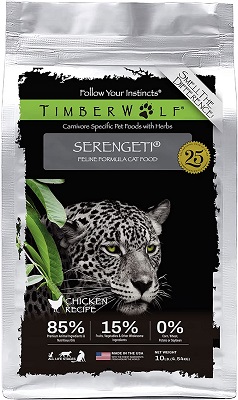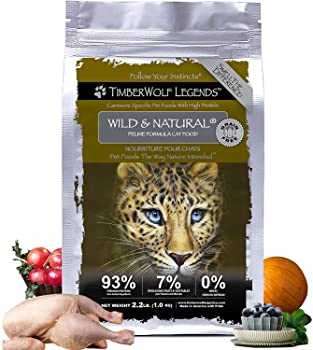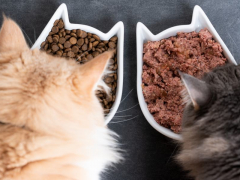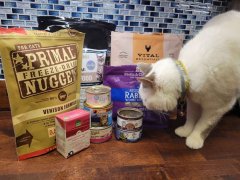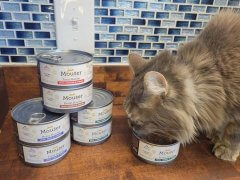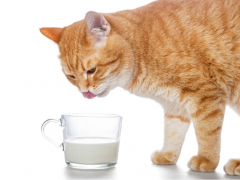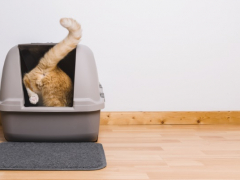Kate Barrington / Cats.com
Formulated to exceed the minimum nutritional standards set by AAFCO, Timberwolf cat food offers a rich source of species-appropriate animal protein supplemented with the essential amino acid taurine. Timberwolf is pricey, but is it worth the cost? Find out in our in-depth Timberwolf cat food review.
We’ve rated Timberwolf Food on ingredient quality, species-appropriateness, recalls, and more. Read our Timberwolf Cat Food review to learn how this brand stacks up.
The Cats.com Standard—Rating Timberwolf Food on What Matters
We’ve rated the brand on six key criteria for quality. Here’s how it rates in each of these six crucial areas.
Ratings
- Species-Appropriateness – 8/10
- Ingredient Quality – 9/10
- Product Variety – 7/10
- Price – 7/10
- Customer Experience – 9/10
- Recall History – 9/10
Overall Score: 8.1/10
In total, we give Timberwolf food a 50 out of 60 rating or a A grade.
About Timberwolf Cat Food
Founded in 2000, Timberwolf is a small, independently owned and family-operated pet food company. Timberwolf’s products are formulated to mirror the nutrition your pet’s ancestors would receive in the wild. According to Timberwolf, this includes animal proteins, nutritional fats, and carbohydrates.
Timberwolf’s tagline is, “Pet foods the way nature intended.” They offer both dog food and cat food, but only dry food formulas.
Sourcing and Manufacturing
This brand is headquartered in Windermere, Florida. Though it was once produced by Diamond Pet Foods under the name Timberwolf Organics, it is now privately owned. I wasn’t able to determine exactly where the food is produced, but the packaging carries an American, Canadian, and UK flag. Neither was I able to find any specific information regarding the sourcing of ingredients.
Timberwolf has a very extensive FAQ page and one of the more interesting questions addresses the fact that the food is extruded and not baked. The brand claims that baked food cooked at 425 degrees for 45 minutes or more results in the starches being converted into dextrins.
By contrast, Timberwolf uses a low-temperature extrusion process that cooks the food between 200 and 225 degrees for 15 minutes or less. This process gelatinizes the starches quickly and, according to Timberwolf, retains more nutrients.
Recall History
Founded in 1999, Timberwolf has a long history of producing high-quality pet foods. They’ve never had a product recalled by the FDA, but they did voluntarily recall two dog food recipes in 2008. The recall was triggered by reports of sick dogs, though no definitive cause for the problem was determined. No cat food products have ever been recalled.
What Kinds of Cat Food Does Timberwolf Offer?
Timberwolf only offers dry cat food, and their selection is limited to three recipes. All three are rich in protein primarily from animal sources.
What Do Customers Think of Timberwolf Cat Food?
Despite being on the market for over two decades, Timberwolf doesn’t have a strong online presence in terms of customer reviews. There are no reviews for the two products available on Amazon and only two reviews posted on the Timberwolf website.
In both reviews on the Timberwolf website, customers gave the recipe 5 stars. One customer commented that the recipe was a hit with her picky eater and the other found that the formula helped her underweight cat gain weight and improved the condition of her coat.
Though I couldn’t find any negative reviews of Timberwolf cat foods, potential complaints would likely be related to the price of several recipes and the lack of variety in their product lineup.
Here are the two customer reviews you’ll find on the Timberwolf website:
Positive Reviews
“Over the years we have tried many different brands of dry cat foods trying to find the one best suited for our cats. One of which used to be feral and was used to a wild diet. We have struggled to maintain weight on her as the other foods would make her stomach upset. Since she has been on Serengeti Platinum she has gained a healthy weight, hasn’t had any stomach issues, has had an increase in energy and has a beautiful shiny coat. This food even smells great, the freshness and the herbs come through the aroma.” – by Modern Gypsy Farms reviewing Timberwolf Legends Serengeti Dry Food on March 4, 2017
“I’ve spent hours researching cat foods (do I love my cat?). I am always hesitant to switch to something else because cats are so finicky, but I decided to go hell for leather and purchased your Serengeti about 6 months ago, well needless to say since I am writing this review, it went well – no better than well. My cat loves it and she seems to be really blooming. I had no problems with her litter box which is also a big plus.” – by Minnie Mouse reviewing Timberwolf Legends Serengeti Dry Food on February 28, 2017
What Did Our Test Cats Think?
Kate Barrington / Cats.com
To test Timberwolf cat food, I ordered all three of their dry food formulas. The food arrived in a plain cardboard box with no excess packaging material.
The food packages were very sturdy, and I appreciated the resealable closure. My cats like to chew on cat food bags, but these held up pretty well against their sharp teeth. The aroma of the food was fairly strong (which is probably why they tried to get into it on their own), but certainly not unpleasant.
The kibbles were very small and round. My cats really seemed to enjoy the Ocean Blue fish formula. Testing the other two recipes was a little trickier because one of my cats is allergic to chicken, but the food was well received all-around.
Timberwolf Cat Food – Top 3 Recipes Reviewed
| Product Name | Food Type | Main Protein Source | Calories | Price | Our Grade |
| Timberwolf Legends Ocean Blue Feline Formula Cat Food | Dry | Salmon | 4,418 kcal/kg | $7.49 per lb | B |
| Timberwolf Legends Serengeti Feline Formula Cat Food | Dry | Chicken | 4,455 kcal/kg | $3.42 per lb | B |
| Timberwolf Legends Wild & Natural Feline Formula Cat Food | Dry | Chicken | 4,480 kcal/kg | $6.82 per lb | B |
How Much Does Timberwolf Food Cost?
Priced between $0.21 and $0.57 per ounce, Timberwolf cat food can be fairly expensive. This puts Timberwolf in the same price bracket as other premium brands like Nature’s Variety Instinct and Organix (Castor & Pollux). The cheapest recipe, Serengeti, is lower in protein than the other two which likely affects the cost, but it doesn’t contain the pea protein found in the other two recipes.
For a 10-pound cat, the recommended daily serving is about ¾ cup. The daily cost to feed your cat Timberwolf cat food ranges from about $0.32 to $0.90, depending which recipe you choose. Though certainly not as cheap as Meow Mix, it’s more economically priced than Ziwi Peak and The Honest Kitchen.
Overall, Is Timberwolf Food a Good Choice?
Pet owners who prefer the convenience of dry food over canned food may find Timberwolf to be a good option. With three recipes to choose from, you can find a recipe that suits your price point.
Every Timberwolf recipe lists an animal protein like fresh chicken or fish as the first ingredient. In fact, all three list animal ingredients as the top two or three ingredients. These formulas do, however, contain some plant protein and a significant number of other plant ingredients.
Another downside of Timberwolf cat food is that it doesn’t contain anywhere near the moisture content you’d find in wet food. Moisture is important for healthy digestion and my help reduce issues like hairballs. Wet food also tends to be a low carbohydrate option by comparison.
Though Timberwolf cat food isn’t perfect, it’s made with high-quality ingredients and rich in animal protein. It’s a pricier brand than Taste of the Wild or Wellness, but some of the higher protein recipes might be a good option if you prefer to feed dry food.
Where Is Timberwolf Food Sold?
The best place to buy Timberwolf cat food is directly on the brand’s website. You can find some recipes on Amazon and may be able to find it in local and independent pet retailers as well as specialty pet food stores.
